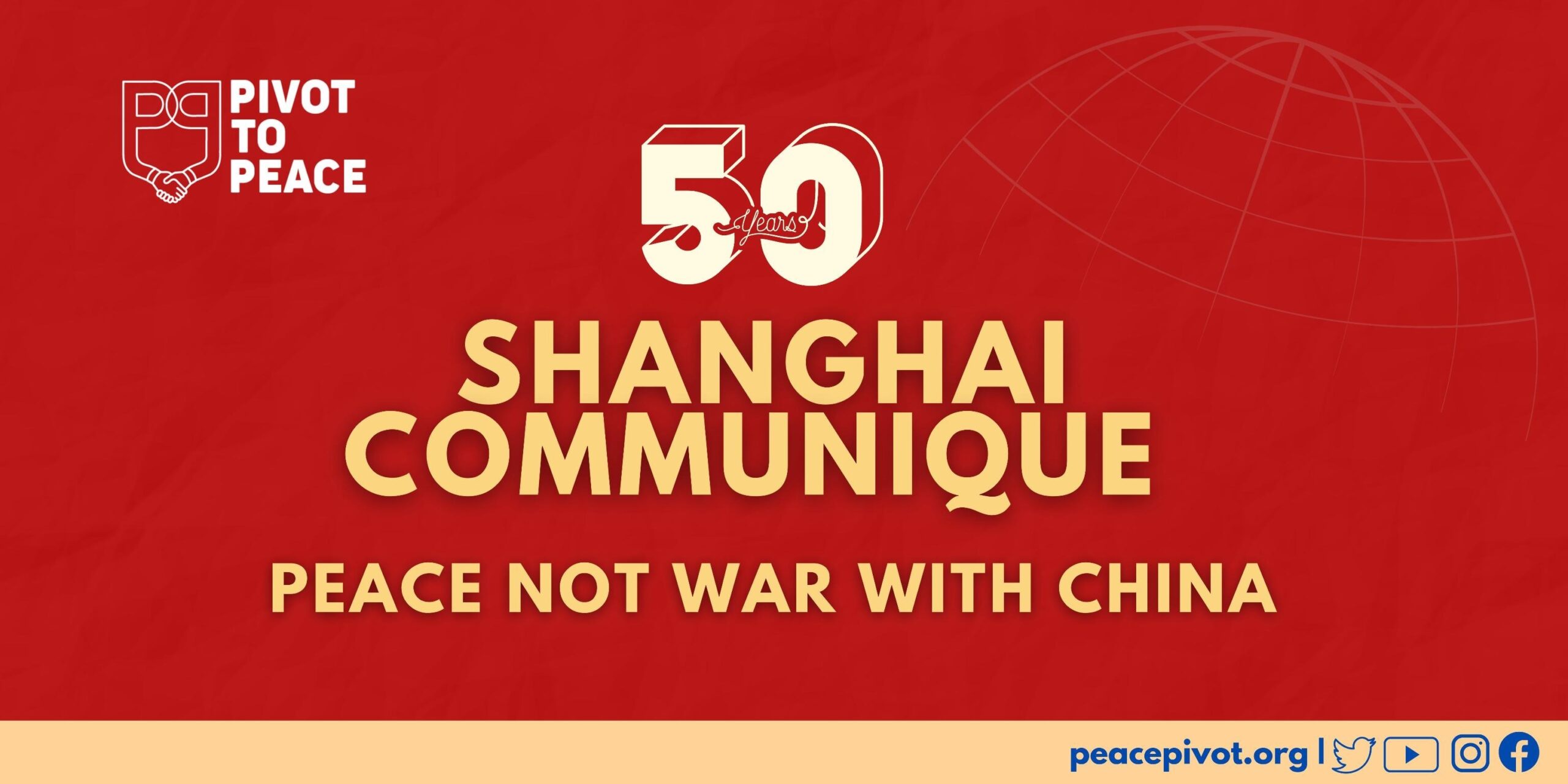
Sign Pivot to Peace’s statement on the 50th anniversary of the Shanghai Communique
By submitting this form, you are consenting to receive marketing emails from: . You can revoke your consent to receive emails at any time by using the SafeUnsubscribe® link, found at the bottom of every email. Emails are serviced by Constant Contact
On February 28, 1972, President Richard Nixon and Prime Minister Zhou Enlai issued the Shanghai Communique at the end of the American president’s path-breaking visit to the People’s Republic of China. As we mark the 50th anniversary of this historic breakthrough in the relationship between our countries it is a time to recall and reaffirm the guiding principles which were established in the bilateral statement agreed to by both sides.
While acknowledging that the United States and China have separate and distinct social systems and foreign policies, both countries committed themselves to “…conduct their relations on the principles of respect for the sovereignty and territorial integrity of all states, non-aggression against other states, non-interference in the internal affairs of other states, equality and mutual benefit, and peaceful coexistence.” Each side set out its position concerning the outstanding issues between them. Both clearly stated their views on the crucial question of the status of Taiwan. The United States declared that it “…acknowledges that all Chinese on either side of the Taiwan Strait maintain there is but one China and that Taiwan is a part of China. The United States Government does not challenge that position. It reaffirms its interest in a peaceful settlement of the Taiwan question by the Chinese themselves.” This remains the binding obligation of the American government.
In recent years, even as the American people have faced increasing economic hardships, as we saw the painful ending of long wars in Iraq and Afghanistan, as climate change has generated devasting weather events, and as our health care system has struggled to cope with the ravages of Covid-19, the United States government has moved rapidly to adopt an increasingly antagonistic posture towards China, diverting resources from much-needed programs at home while expanding an already bloated military budget.
In 2011 President Obama announced the “Pivot to Asia” aimed at encircling and containing China. During the tenure of Donald Trump, the United States adopted the official position that its military must prioritize planning for major power conflict with the Peoples Republic. This position has not shifted since President Biden took office. Central to US war plans in Taiwan. This constitutes a reckless abandonment of the core principles of a policy adopted by the United States fifty years ago when the normalization of relations between China and the US began in earnest. The Trump administration further pursued its hostile stance by promoting a “trade war” which has hurt American consumers and done little to address the problems facing the U.S. economy. The Biden administration has if anything become even more aggressive in its rhetoric and actions, secretly sending military forces to Taiwan, engaging in various provocative maneuvers in the Taiwan Strait, and violating both the letter and the spirit of the Shanghai Communique by interfering in the internal affairs of China in many ways.
As Americans believing that it is better to seek peace than to promote war, and that the interests of our people will be better served by policies of cooperation with China in a quest for a mutually beneficial future in economic development, addressing climate change, and reducing the global menace of militarism and armed conflict, we call upon American political leaders of both parties, in the White House and in Congress, to publicly affirm their respect for the principles embodied in the Shanghai Communique, to turn away from a path which leads to confrontation, and reorient America’s relationship with China in a positive, constructive direction. Withdraw US troops from Taiwan, cease provocations in the Taiwan Strait, and allow the question of Taiwan to be resolved by the Chinese people on both sides of the Strait themselves, without outside interference and manipulation.
Join us for events in San Francisco and Washington D.C. on the 50th anniversary of the Shanghai Communique demanding Peace, not war with China. Click on an event below to RSVP:
Initial Signers of the Pivot to Peace Shanghai Communique Statement
1. Ding Bong Lee, Board of Directors of the Chinese Consolidated Benevolent Association
2. Committee to Promote Reunification of China
3. Ann Wright, Veterans For Peace, Hawaii Chapter 113, Chapter coordinator
4. Eric Mar, Asian American Studies, SF State University, Emeritus Professor
5. Gerald Belsky, Schiller Institute, Outreach Task Force
6. Gerald Pass, U S-China People’s Friendship Assn.
7. Gerry Condon, Veterans for Peace, Past President
8. Jodie Evans, CODEPINK, co-founder
9. Joseph Essertier, Nagoya Institute of Technology, Associate professor
10. Michael Wong, Veterans For Peace China Working Group, Co-chair, Veterans For Peace China Working Group
11. Adrian Swanston, Organised Labour #500, Certified Heavy Duty Mechanic
12. Alan Batten, Treasurer
13. ALLEN YU
14. Andreas Kolar, Artcoli SAS, President
15. Andrew Lee
16. B. Keith Brumley, Veterans for Peace
17. Bai Bee Yeh, AARP
18. Ben Kroup, United Peoples
19. Bernard Elias, Just Say No to Work Yes to Art
20. Betty Kano, JAWAUCB
21. Bevan Ramsden, IPAN
22. Charles Byrne
23. Chienfan Yu, Globalfoundries, PMTS
24. Chin Seah, Structural Engineer
25. Christian Féard
26. Christina Leung
27. Claudia Karas, Dissolve NATO
28. Colin Man
29. Dawit Afework, Transport
30. David Cooley, Veterans for Peace
31. David Hartsough, Peaceworkers, Director
32. David Scheidt, Durham Central Park Cohousing Community
33. David Stupin
34. David Tay, Mintmark, Managing Director
35. Denise Lytle
36. Donald Ross
37. Douglas Ryder, Veterans for Peace, Eisenhower Chapter
38. EDWARD CIACCIO
39. erdman palmore, Veterans for Peace, Eisenhower Chapter
40. Eric Meyer
41. Francis Collins, Veterans for Peace
42. Frank Kehl, US-CX, INC, President
43. Fred Perkins, Fred Perkins, Rtd
44. George Koo, Freschfield LLC, Commentator
45. Gregory Leung, California Public Health
46. Guiru Nash Liu, Caterpillar
47. HB Ooi, Elev8 Living PTE. Ltd.
48. Heather Cantino
49. Hilda Richey
50. Hsi Chou, Counterpoint International LLC
51. Iris Edinger, Retired LAUSD, Retired LAUSD teacher
52. James Williams, Veterans for Peace, Member
53. Jan Ellis
54. jannan lee
55. JEAN CHEUI HSUNG, Medtronic Inc, Principal Firmware Engineer(retired)
56. Jeffery Hull, CODEPINK
57. Jenn Yeh
58. Jilan Su, Second Institute of Oceanography, MNR, China, Honorary Director
59. Jim Bearden, Sky Pilot Software, Software Developer
60. Joan Chow
61. john womack, harvard university, professor emeritus
62. Jon Anderholm, Xun Biosphere Project, forester
63. Jonathan Smith, NLP
64. Jonathan Squire, NHS, IT Engineer
65. Joyce Hall, Pax Christi Dallas, Local Dallas, TX coordinator
66. Judith Bello, United National Antiwar Coalition, Administrative Committee Member
67. judith sandoval, Veterans for Peace
68. Kaiching Chu
69. Kenneth Mayers, Veterans for Peace, Santa Fe Chapter Secretary
70. Kenny Chin, Chin Family Foundation
71. KilSang Yoon, KANCC
72. Kim Eng Kpp, Rocky Mount Racial justice
73. Kit Baril, ANSWER Coalition, Organizer
74. Lauren Gonitzke, CODEPINK
75. Leona, Stucky-Abbott, Listening Sage Associates
76. Leonie Rushforth, Retired teacher
77. Lynn Sy
78. Madison Tang, CODEPINK
79. Marcy Gordon, Public Intellectuals for Social and Spare Change
80. margaret peeples, Veterans for Peace
81. Mark Reisinger, Binghamton University, Associate Professor
82. Martha Hubert, CODEPINK
83. Martha Rich, Fairbanks Peace Choir, President
84. Mary Ann Maikish, Retired from Bellevue Hospital
85. Mei Lam, Coalition for Peace
86. Mei Mei Chan, ANSWER Coalition
87. Melissa Sachs, PSL
88. Mike Caggiano, Peace Action of San Mateo County, President
89. Mike Casey, Teacher
90. Mumtaz Shaik
91. Nadya Williams, Veterans For Peace, San Francisco Chapter 69, Director of Communications
92. Nettie McGee
93. Nicholas Coti, State of Alaska
94. Paul Cox, Veterans For Peace, San Francisco Chapter 69, Founder and Secretary
95. Paul Greenberg, IUPAT LOCAL 510
96. Paul Pumphrey, Friends Of The Congo
97. peggy dobbins, Fund For Reparations Now, board member
98. Philip Nash, IIT
99. philip noyce, Mass Peace Action/VFP
100. Philman Wu, Retiree
101. Rachel Clark, Veterans for Peace, Interpreter/Global Coordinator
102. Raymond Chu, Raymond Chu, Sunnyvale, Dentist
103. Richard Ochs, Baltimore Peace Action, Chairman
104. Richard Rothschiller
105. Robert Kolkebeck
106. Robert RICHARD, Veterans for Peace, Chapter 35, PO-2 USNR
107. Roberta Stern, Therapists for Peace & Judgement
108. Roland Hahnel, University of Western Australia
109. Roland Verrier
110. Ron Carver, Campaigns for Social Justice, Executive Director
111. Roy Birchard, Fellowship of Reconciliation
112. Sally-Alice Thompson, Veterans for Peace
113. Sherri Maurin, Veterans for Peace
114. Simon Korner, Teacher
115. Simon Leung, Ca DHCS, Pharmacist
116. SIU HIN LEE, China-US Solidarity Network, National Coordinator
117. Stephen Ng, Propnex, Real Estate
118. Stephen Roddy, Professor
119. tarak Kauff, Peace & Planet News, Editor in Cheif
120. Tehlin Chen, Baodiao Forum, retiree
121. Temay So, CODEPINK
122. Thomas Westheimer, Nhpa
123. Tim Beal
124. Timothy Havel, Massachusetts Peace Action
125. To Shing
126. Tom McGuire
127. Tony Chiok
128. Wemin Chow
129. William Dere
130. Winston Liang, AT&T, Mr. Winston Liang
131. Yeow Aun Lim
132. Yu Hwong, USNC, Physician
133. YUEN NG
134. Zach Farber, ANSWER Coalition, Organizer
